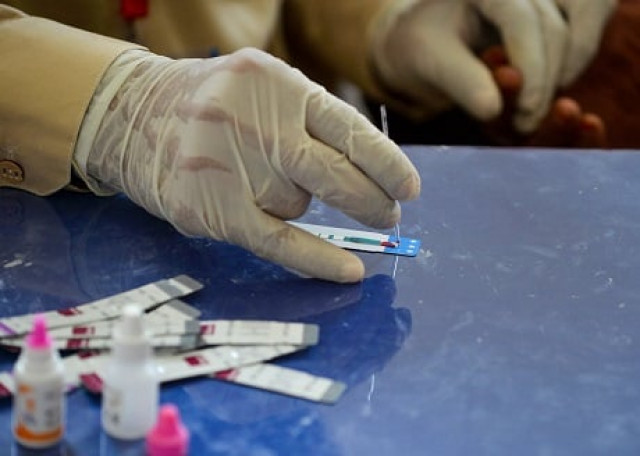The doctor who unearthed Ratodero’s HIV epidemic
Two years on, Dr Arbani continues to serve his patients, despite no assistance from govt

It was on April 24, 2019 that the world was familiarised with a scare that had been plaguing Ratodero, a remote, sleepy town located 30 kilometres north of Larkana, for days, or may be weeks, or even months. For the rest of the world, it was the beginning of a terrifying tale that it would witness from afar. For the unsuspecting residents of Rato Dero, it was the dawn of the realisation that they were in the middle of an emergency with seemingly no end in sight.
However, for 41-year-old Dr Imran Arbani, who has a private practice in Ratoedero, minutes away from the town’s taluka hospital, the realisation came much earlier.
Two years on, he recalls it was the morning of February 12, 2019 when a father brought his then two-year-old daughter to Dr Arbani at Fizza Clinic. Hers would be the first known case of a child testing positive for the human immunodeficiency virus (HIV) during the 2019 epidemic in Ratodero - over two months before the news broke.
“After examining the girl, I advised her father to take her for an HIV test,” says Dr Arbani, who, despite his hunch that she was suffering from the deadly virus, was shocked, nonetheless, when the test returned positive. He then advised the father to go for a second test in Karachi. The second test confirmed his suspicion as well.
Read more: HIV outbreak sparks panic in Larkana's Ratodero
What followed was a wave of patients, most of them children, testing positive for HIV and acquired immunodeficiency syndrome (AIDS) - the disease the virus leads to if left untreated.
By February 22, 2019, at least 15 children had been diagnosed with HIV in Ratodero.
Dr Arbani had unearthed an outbreak, which made headlines around two months later - on April 24, 2019 to be exact.
Screening for HIV/AIDS began in Ratodero the next day, with the Sindh government scrambling to respond to the crisis the world had now been alerted to. Screening camps were set up, health teams were sent, and an urgent response was prepared.
According to the World Health Organisation’s website, from April 25, 2019 to June 28, 2019, 30,192 people were screened for HIV and 876 of them were found positive. The website states that 719 of them - 82 per cent - were under 15 years of age.
After two years and a pandemic, the world has turned its attention to other pressing matters. But the disease continues to plague Sindh’s remote town. In February this year, The Express Tribune reported the death of another HIV positive child in Ratodero. It lifted the HIV death toll among Ratodero’s children to 47 since April 2019.
Unsafe medical practices
As documented and reported several times since, Dr Arbani, too, attributes the prevalence of HIV in the area to unsafe medical practices, particularly reusing syringes.
He says he had been seeing local doctors reuse syringes and initially, he thought this to be the primary cause behind the HIV outbreak.
“And [unfortunately], I was right,” he says morosely.
Then, it doesn’t come as a surprise that, it was, in fact, a doctor who was held responsible for the epidemic in Ratodero. The doctor, Muzaffar Ghangro, was believed to have infected almost 900 children by injecting them using contaminated syringes. Dr Ghangro has vehemently denied the charges of injecting children with infected syringes, but admitted that he reused syringes in many instances. There have also been numerous claims since implying that Dr Ghangro, though not without fault, was scapegoated by health authorities who were slow to respond to the early signs of an epidemic.
The improper disposal of medical waste and the prevalence of quacks - fake doctors - have also been identified as major factors that contributed to the problem.
In December 2019, a report published in these pages underscored that in the area near Dr Ghangro’s clinic, “If you simply glance around the unpaved streets, you will notice plenty of used syringes and other medical waste being kicked around by passersby.”
As recent reports suggest, not much seems to have changed since.
Unsung hero
So, Dr Arbani had rightly identified the problem, and he has been doing all he can to rid his town of the menace, but has received little appreciation from the government for his efforts. Yet, he continues to work for the cause.
According to a local doctor, who asked not to be named, Dr Arbani is the man behind the closure of several clinics in Ratodero, where malpractices were rampant.
“The reuse of syringes was common across Sindh, but it is not as common now,” he says, adding that foreign delegations and top officials have been visiting Sindh’s remote towns more frequently and most of them prefer to meet Dr Arbani to get a clear picture of the health sector and work for its betterment.
Dr Arbani brought Rato Dero’s health crisis into the limelight, prompting authorities and the international community into action, but, Dr Arbani says, he is not in the good books of the Sindh government and local doctors since he reported the HIV epidemic and doctors’ malpractices.
“But I don’t care if they dislike me. It was my duty to highlight the issue and I am thankful to local residents who cooperated with me and understood the gravity of the situation.”
When one asks him about being acknowledged and appreciated by the authorities for his commitment to the cause, he smiles.
“Not a single word [of appreciation] from the federal and the provincial government as yet. The government seems to be unhappy with me.”
The international community has, however, recognised his efforts and accomplishments. In his clinic, walls are ornate with a myriad of certificates awarded to him by different organisations. Among those are ones recognising him for having reported the HIV epidemic and setting a world record after performing a surgery, wherein he removed a stone weighing 620 grammes from a patient’s body in 2008.
The best reward for him, though, is the happiness and contentment he gets by serving the people. He is familiar with most of the residents of the area and knows them by their full names and is always ready to help them.
“I get respect from my patients and their families and that’s enough for me.”


















COMMENTS
Comments are moderated and generally will be posted if they are on-topic and not abusive.
For more information, please see our Comments FAQ